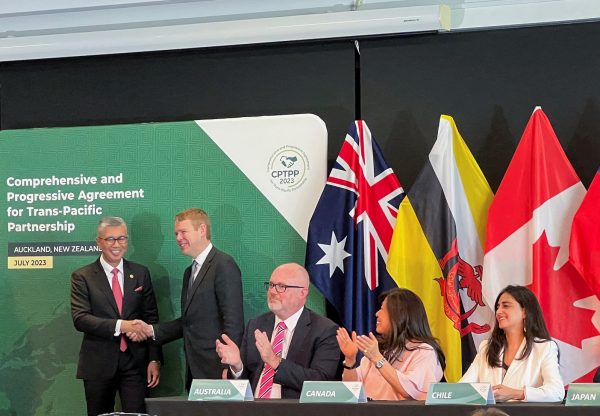The CPTPP, originally known as the Trans-Pacific Partnership Agreement (TPP), was agreed upon in 2015 by 12 countries, including Singapore, Australia and the United States. The United States announced its withdrawal in 2017 during the administration of former president Donald Trump. But the other 11 signatories decided to sign and ratify a slightly revised version of the original TPP agreement as the CPTPP, which entered into force in December 2018.
The CPTPP is characterised by a high level of liberalisation of trade in goods and services. In principle, the signatory countries are required to eliminate tariffs on virtually all goods in 15 years — with the final intra-regional trade liberalisation rate exceeding 99 per cent of tariff lines. The CPTPP also includes advanced measures for the services trade, such as common rules for data localisation and a ban on requirements related to source code transfers.
The United Kingdom has already concluded bilateral free trade agreements with many CPTPP member countries, including the Japan–UK Comprehensive Economic Partnership Agreement. Yet as the United Kingdom’s Secretary of State for Business and Trade Kemi Badenoch stated, the CPTPP is ‘about much more than boosting exports’ — it represents a vision ‘about the future and the world that we want to live in’.
For Japan, the United Kingdom’s accession to the CPTPP is politically and economically important. Of particular significance is its relation to Japan’s ‘economic security’ policy, which has become a key area for Prime Minister Fumio Kishida’s administration. Japan enacted the Economic Security Promotion Act in May 2022 and conceptualised economic security as a matter of national security in its new National Security Strategy released in December 2022.
Some characterise economic security as increasing state oversight over sensitive technologies and infrastructure through strengthened trade controls and investment regulations. A common fear is that such measures could lead to the fragmentation of trade blocs in the world economy.
But Japan’s approach to economic security is based on two pillars — ‘strategic autonomy’ to resist foreign pressures and ‘strategic indispensability’ to establish a state where Japanese products and services are indispensable to other countries. This approach is built on the foundation of a free trade system.
In recent years, there has been growing concern about trade-related economic coercion. Some countries have sought to exert political pressure on their trade partners through export and import restrictions and other non-market policies and practices. During the July 2023 CPTPP Commission meeting, the CPTPP signatories adopted a ministerial statement positioning the agreement as a ‘means to address economic coercion’.
The United Kingdom is a G7 member and a likeminded partner that shares fundamental values of economic freedom with Japan. With the United Kingdom reinforcing shared values within the CPTPP, there would be potential for the agreement to act as a deterrent against countries pursuing coercive policies in East Asia, reducing the considerable geopolitical risks in the region.
Since Brexit, the United Kingdom has sought to expand its economic and security presence in the Indo-Pacific, as underlined by its Integrated Review published in 2021. The United Kingdom’s joining of the CPTPP will cement this goal, with a more substantial British presence in the region expected to increase the influence of treaty parties, including that of Japan.
The CPTPP has followed EU-style rules on commerce. The United Kingdom’s participation in the CPTPP will allow it to evolve into a framework that is not limited to the Pacific. With the United Kingdom acting as a bridge, there is a possibility that CPTPP rules, which were originally conceived independent of European regulation, could be harmonised with EU rules. This would create a large transregional regulatory area.
The European Union follows the General Data Protection Regulation, established in 2018, which enforces stringent personal data protection measures. This significantly differs from the data protection policies of many Asia-Pacific countries.
The CPTPP’s provisions on data protection and Investor-State Dispute Settlement mechanisms are not typical measures adopted by the European Union in its free trade agreements. But the United Kingdom’s accession to the CPTPP could be the beginning of a movement to bridge the differences between ‘EU-type rules’ and ‘CPTPP-type rules’ in policy coordination between the United Kingdom and the European Union.
If attempts to harmonise the rules of the Asia-Pacific region with those of the EU are promoted, trade and economic exchange between Asia and Europe will be further facilitated in the medium- to long-term.
The CPTPP — which promotes rule formation, trade liberalisation and data distribution — plays an important role in supporting Japan’s ‘strategic autonomy’ and ‘strategic indispensability’. The participation of the United Kingdom will expand the CPTPP’s reach, which in turn will contribute to maintaining the rules-based international order founded on free trade and economic openness.
Satoru Kohda is a Research Fellow at Deloitte in Tokyo.
Ayaka Hiraki is a Research Fellow at Deloitte in Tokyo, and PhD student at Keio University in Tokyo.

